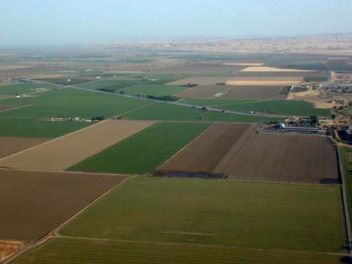California agriculture top initial Beijing target as trade dispute escalates

California’s massive agriculture industry is China’s top initial target as Beijing responds to the Trump administration’s vow earlier this month to slap tariffs on some $50 billion of Chinese steel and aluminium imports.
In an announcement over the weekend, Chinese trade officials said California’s nuts, fruit and wine were among 128 U.S. imports that would face a new 15 percent tariff upon reaching Chinese shores. The total annual value of the imports is about $3 billion, according to a San Francisco Chronicle report, suggesting that for now Beijing is not eager to escalate its trade dispute with Washington over alleged Chinese steel and aluminum dumping on the international market and theft of U.S. intellectual property.
After Canada and the European Union, China is the third biggest international customer for Golden State agriculture, importing more than $2 billion worth in 2016, according to an official state report. That’s around 10 percent of California’s total of $21 billion in international agricultural exports in 2016. Pistachios, plums, oranges and almonds were the state’s most popular products with Chinese consumers.
Even before the formal Chinese announcement of retaliatory tariffs, many observers were wary of how California could be buffeted by a U.S-China trade war.
“We could be in a really nasty trade spat, and we’ve seen that agriculture is usually a big target. … We are greatly concerned,” a California Farm Bureau Federation official told the Los Angeles Times in a March 2 story. A UC Davis economist interviewed by the Times voiced similar concerns, noting California agriculture is more dependent on international sales than other large agricultural states.
Some farmers welcome fight, cite unfair practices
But in Kern County, according to a Bakersfield Californian report, anxiety was tempered by a sense among some farmers that it was time someone stood up to the unfair trade practices they said they dealt with in the Chinese and South Korean markets.
Dennis Johnston, a partner in Edison-based Johnston Farms, said powerful farming lobbies in the Asian nations had established barriers to California imports that didn’t involve tariffs, such as additional fumigation requirements that cut into California growers’ profits.
It’s nothing new for California agricultural interests to be early targets in trade disputes, including with nominal U.S. trade allies like Canada and Mexico. Because food has a limited shelf life, tariffs can take a relatively quick toll on a targeted nation. Tariffs on familiar consumer products like wine or grapes can also grab headlines in ways that tariffs on machine parts probably can’t. Analysts say that’s why the next target of China after California – at least if Beijing’s trade dispute with the Trump administration escalates – is likely to be pork products from Midwestern states. There would also be a political factor in such a move – these states often swing from party to party and Donald Trump is likely to need some or most to gain re-election in 2020.
But there’s a third view evident in Golden State reaction to China’s tariffs beyond alarm and the belief that some attempt to confront Beijing over its trade practices is necessary. That’s the view that this fight might fizzle out.
In an analysis posted by the Times over the weekend, Richard Matoian, executive director of the California-heavy American Pistachio Growers, said, “From what we’ve seen, the Trump administration can be very unpredictable. … There’s still a month yet before any tariff would take effect, so there’s going to be a lot of political posturing.”
Chris Reed
Chris Reed is a regular contributor to Cal Watchdog. Reed is an editorial writer for U-T San Diego. Before joining the U-T in July 2005, he was the opinion-page columns editor and wrote the featured weekly Unspin column for The Orange County Register. Reed was on the national board of the Association of Opinion Page Editors from 2003-2005. From 2000 to 2005, Reed made more than 100 appearances as a featured news analyst on Los Angeles-area National Public Radio affiliate KPCC-FM. From 1990 to 1998, Reed was an editor, metro columnist and film critic at the Inland Valley Daily Bulletin in Ontario. Reed has a political science degree from the University of Hawaii (Hilo campus), where he edited the student newspaper, the Vulcan News, his senior year. He is on Twitter: @chrisreed99.
Related Articles
Silicon Valley loses to DC as richest area
Jan. 28, 2013 By John Seiler Until recently, Silicon Valley enjoyed the highest median income in the United States. That
Frank Luntz and Willie Brown debate or entertain?
In the Red Corner was Frank Luntz, political pollster and consultant. And In the Blue Corner, Willie Brown, former Speaker
California is broken, not broke
Sept. 7, 2012 By John Seiler Our colleague Steven Greenhut writes today on Bloomberg about, “Scandals show California is broken,


